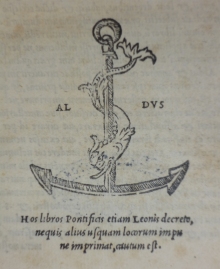Libri de re rustica
Cato, Varro, Columella & Palladius (1514) Libri de re rustica. Venice: Aldine Press (14684-1001).
The earliest item in the Historical Collection is a 1514 copy of the Libri de re rustica (Book of country affairs) published by the Aldine Press in Venice. .

Marcus Porcius Cato (234-149 BC) wrote De agri cultura c160 BC. This text deals with the development of vine, olive, and fruit growing.
Marcus Terentius Varro (116-27 BC) wrote Rerum rusticarum c36 BC. This work is divided into three books dealing with farm buildings and labour; the breeding, management and feeding of animals especially sheep; and birds, fowl, bees and fish ponds.
Lucius Junius Moderatus Columella was a Roman citizen born in Cadiz. His text De re rustica covers the care, management, breeding and feeding of all domesticated animals.
Palladius who lived in 400 AD wrote a work on agriculture in fourteen books.
Our copy of this book was purchased in 1963 for £25.
The photograph shows the colophon or printers mark at the end of the book.
To view this, or any other book in the Historical Collection, please contact us at [email protected] or 020 7202 0752 to arrange an appointment.